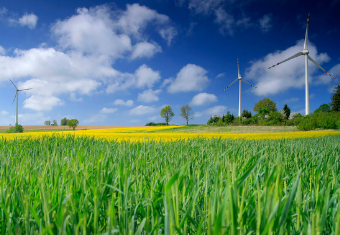Silesia – the industrial heart of Poland may become a wind energy hub. A similar transformation path was followed by the Basque Country.
Its capital – Bilbao – hosted last week the global leaders of the wind energy industry during the WindEurope conference and exhibition.
Silesia was represented by Krzysztof Sitarski (Kukiz’15). In a panel dedicated to regional transformation he discussed the role of power coal and coke coal as materials necessary for the development of renewable energy.
The Basque Country is a perfect example of successful structural transformation of the local economy. Its example demonstrates that even a region without the best conditions for wind farms may gain huge benefits from the development of the wind energy sector by producing and exporting the technology worldwide. Today, the Spanish autonomous region hosts more than 100 companies related to the wind energy sector. Its capital – Bilbao – is the headquarters of Siemens Games Renewable Energy and Iberdrola, a strong members of the supply chain.
Both regions have long-standing industrial tradition in common. However, the Basque Country is very advanced in its transformation. The Basques bet on the development of wind energy-related industry, which contributed to the revival of the regional economy.
Sitarski shared his personal experiences during the round table dedicated to regional transformation. As a former miner, he stressed the need for structural changes to be carried out in a socially just manner. In his opinion mining should be separated from energy production, and the future lies with hydrogen. In Sitarski’s opinion this may be a grat trump for the Silesian economy.
María Belarmina Díaz Aguado, Director-General for Mining and Energy in Principality of Asturias (an autonomous province in Spain), whose economy is based on cal mining as well as metallurgical, machine, shipbuilding and chemical industry, called for EU support for coal-based regions. “In the transitory period we must face the challenges, including those related with ageing population. On the other hand, we have advantages such as long-standing industrial tradition and technical abilities of the people living in our region,” she noted.
Asturia intends to attract the young by investing in new jobs around the emerging electro-mobility market.
The European Commission’s Director of Energy Policy, Megan Richards emphasized the Brussel’s involvement in the transformation of coal-based regions. However, a project dedicated to the issue is to be compliant with the 2030 EU Climate and Energy framework.
Were Silesia to follow the path of the Basque Country, it might pluck for the region a bit from the vast wind energy industry, which is bringing EUR 36 billion per annum all over Europe and generating EUR 8 billion in exports. The industry created approximately 263 thousand jobs in plants and companies related to the entire supply chain. More importantly, the jobs are placed in less economically-privileged regions.
Silesia seems to be very active in its attempts to enter such a path. This is demonstrated by the recent initiative of the Marshal’s Office of the Silesian Province. The province established the “Regional Team for Coal Regions in Transition Initiative”, which is to solicit inclusion of new projects in the Coal Regions in Transition initiative and obtain funds under the Just Energy Transition Fund.
The Polish Wind Energy Association team yet again represented the Polish wind energy industry on the European scene during the WindEurope’s 2019 Conference & Exhibition in Bilbao, held on 2-4 April. Among others, the WindEurope 2019 panel dedicated to just transformation was participated by Michał Kurtyka, Secretary of State in Ministry of the Environment.
Apart from organising a Polish stand, PWEA hosted industry representatives during its side event on 3 April, dedicated to the current opportunities onshore and offhsore in Poland for entities from the entire supply chain.

